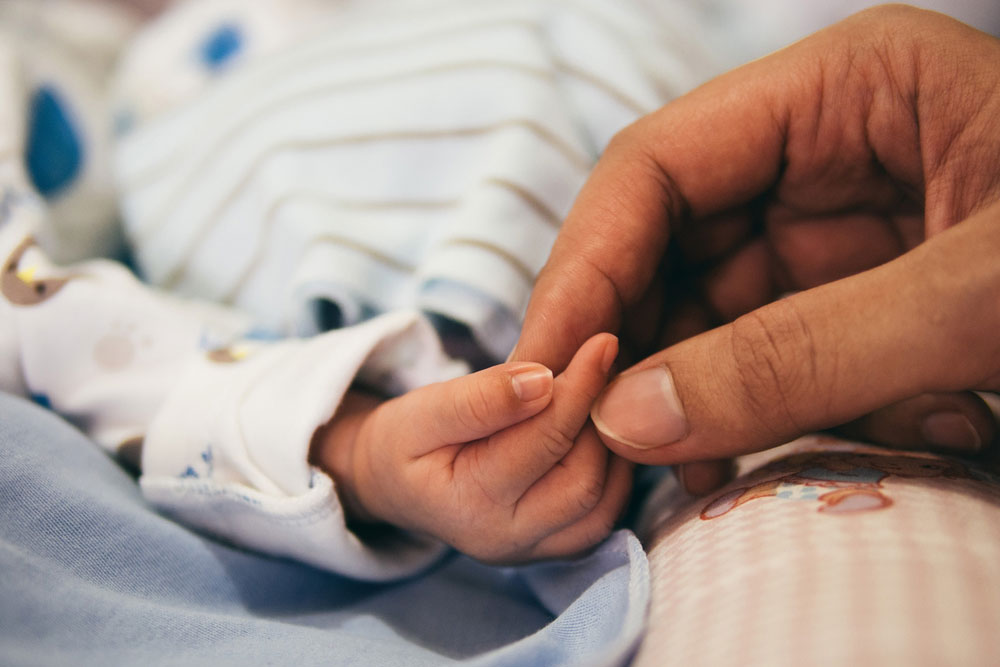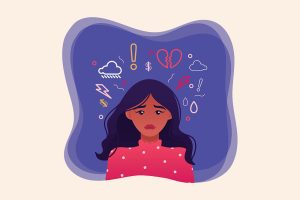Is It Baby Blues or Postpartum Depression?
Published on June 6th, 2018
Updated on January 2nd, 2024

It is common for mothers who have recently given birth to have a low mood or struggle with sadness. Oftentimes these kinds of feelings are temporary and fade as time passes. You may hear of this experience as the baby blues.
The Baby Blues
The baby blues refers to a mildly depressed mood after giving birth. When a mother has the baby blues, she may be more irritable than normal. She may have mood swings and struggle with some anxious feelings. Mothers who have the baby blues may feel overwhelmed or fearful for the well-being of their baby or feel dependent on their partner for support. Mothers can feel the baby blues for one to three weeks after their first slump in mood, and the change can occur between one day and two weeks following the birth of the baby. When symptoms last longer than two weeks or worsen over time, the mother may be suffering from postpartum depression.
Postpartum Depression
Postpartum depression is a form of depression that affects mothers after giving birth. It is a condition that can be alarming for a mother, but it is not uncommon. Many mothers experience postpartum depression, especially after giving birth for the first time.
Sponsored by

Choose a therapist to work with and start healing with 20% off from BetterHelp.
Click HerePostpartum depression can be experienced at varying levels of severity. Mild forms may cause crying spells and anxiety. More severe forms have the potential to show psychotic symptoms along with other symptoms that are hazardous to the health and well-being of both the mother and child.
Symptoms Of Postpartum Depression
A mother suffering from postpartum depression will experience symptoms that cause mood swings and anxiety. These symptoms may affect the mother’s ability to bond with her baby. It may also affect her ability to perform her duties as a mother.
Mothers with postpartum depression are vulnerable to different symptoms. Such symptoms include:
- Depressed mood
- Crying spells
- Mood swings
- Anxiety
- Typical symptoms of depression
- (Loss of appetite, changes in sleep patterns, isolating self from friends and family,)
- Fatigue and insomnia
- Difficulty focusing
- Negative self-talk
- Doubt about competence as a mother
- Feelings of inadequacy
- Avoiding contact with baby
- Inability to bond with baby
- Thoughts of harming or abandoning the baby
Symptoms most commonly begin to develop as early as days after giving birth or as late as 6 months after birth. In severe cases, a mother can experience psychotic symptoms (paranoia, delusions, and disorientation).
What Causes Postpartum Depression?
Different factors can cause postpartum depression. A mother goes through many changes when she gives birth. These changes can cause her to feel overwhelmed, which can lead to anxiety and a depressed mood. Changes that can cause postpartum depression include:
Bodily Changes
There are changes in hormone levels of the body that can lead to a depressed mood. Also, exhaustion from giving birth can leave a mother’s body and mind fatigued and vulnerable to mood changes.
Changes That Come With A Newborn
The stress of a new baby is exhausting. Sleep deprivation and the stress of a crying baby can be overwhelming for a mother. Exhaustion can cause a mother to struggle with emotional stability and regulation.
Changes For New Mothers
New mothers can be more vulnerable to postpartum depression than experienced mothers. The birth of a mother’s first baby brings about many lifestyle changes. Preparation for a new baby is important, but there are some things that a new mother does not know to prepare for. The challenges that come with a new baby can overwhelm a new mother, which can cause her to become depressed.
Risk Factors For Baby Blues And Postpartum Depression
Pre-existing issues can put a mother at risk for both the baby blues and postpartum depression. Some risk factors for postpartum depression include:
- Poor emotional regulation skills
- History of mental illness (specifically anxiety and depressive disorders)
- Financial issues
- Relationship issues
- Poor support system
- Poor education about pregnancy, childbirth, and parenting
- Family history of postpartum depression or other mental health issues
Treatment for Postpartum Depression
Postpartum depression should be taken seriously. Leaving a case untreated can have devastating consequences. Postpartum depression can last for months and can have long-term consequences if not properly treated.
New mothers may feel alone in their struggle if not properly supported. Patience and understanding can empower a mother suffering from postpartum depression to seek the help she needs. Fortunately, medical and mental health professionals are equipped to help a mother who is suffering from postpartum depression.
Treatment options for postpartum depression include:
- Talk therapy. Talk Therapy helps to reduce symptoms of postpartum depression. During talk therapy, a new mother has the space to get in touch with how she is feeling about giving birth. It provides a safe space for a mother to confront her feelings of fear, anxiety, and sometimes loss for the life she had before she became a mother. Talk therapy can help a mother build a support system and safety plan, which helps to ensure her safety and the safety of her baby.
- Psycho-education. Understanding what is going on with a mother’s body, mind, and baby helps a great deal when learning how to cope. Learning about what postpartum depression is and how it affects mothers helps to normalize the experience. This can reduce negative self-talk and guilt for struggling as a parent. Psychoeducation about the condition will also help a mother learn what she needs to take care of herself and feel supported by others.
- Psychiatric medication. Sometimes, a mother needs psychiatric care along with therapy. In such cases, medication will be prescribed to the mother while she learns how to cope with her condition.
The mother’s friends and family need to learn about postpartum depression. Feeling judged, dismissed, or misunderstood can cause a mother with postpartum depression to feel helpless. Feelings of helplessness may prevent a mother from investing in proper mental health care.
Suffering from postpartum depression is scary, but it is not hopeless. If you have concerns about postpartum depression for yourself or a loved one it is important to speak with your doctor or mental health professional. They will have the resources and tools needed to keep you and your family well.
Sponsored by

Find an affordable therapist online with 20% off from BetterHelp.
Click Here






Leave A Reply